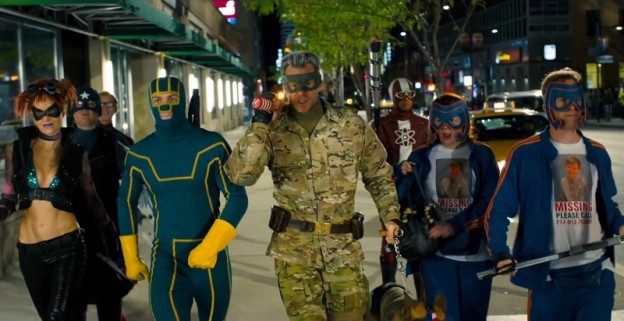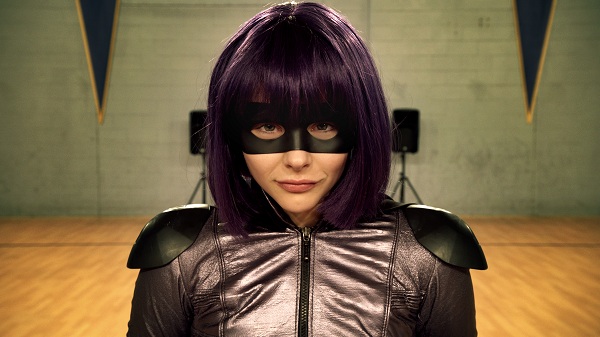The twin apexes of the superhero genre are undeniably Christopher Nolan’s The Dark Knight and Joss Whedon’s The Avengers. While the former proved that a film about a costumed hero can truly be art, the latter broke the mold for how comic books can be brought to life, converging several franchises into one blockbuster event. However, one great distinction needs to be made about both films: they’re rated PG-13.
Even while some of Nolan’s trilogy strays close to extreme violence, the truth is that R-rated superhero films have yet to establish themselves as reliable box office draws. The mediocre box office performance of films like Dredd and Watchmen underscore an apparent hesitation from audiences to embrace R-rated superheroes. So the fact that Kick-Ass 2 even exists at all is a bit of an anomaly.
Based on the comic book by Mark Millar and John Romita Jr., this sequel to the 2010 film sees the return of Aaron Taylor-Johnson as Dave Lizewski/Kick-Ass, who – along with Mindy Macready/Hit Girl (Chloe Grace Moretz) – has turned his back on the superhero game after taking down crime boss Frank D’Amico (Mark Strong) at the end of Kick-Ass. However, normal life predictably pales in comparison to the rush of fighting crime, and Dave soon finds himself joining the burgeoning superhero team Justice Forever (an obvious nod to DC’s Justice League), led by the born-again mobster Colonel Stars and Stripes (Jim Carrey). Little do our heroes know that a new super-villain named The Motherf**ker (Christopher Mintz-Plasse) is out for revenge.
While Kick-Ass served as a smart satire of superhero films, its sequel lacks that same sharp sense of self-awareness. The film largely takes strong advantage of the groundwork laid by its predecessor – in particular, the follow-up to the death of Big Daddy (Nicolas Cage) is well-handled – but doesn’t do enough to develop the series’ unique tone. In several instances, Kick-Ass 2 makes blatant reference of just how ridiculous it is, but rather than coming off as an incisive look at the comic book genre, it ends up merely exploiting cliche to compensate for its own lack of creativity.
This applies too to the film’s violence. Months before its release, Carrey refused to do promotion for the film, based on its extreme violence and an apparent change of heart the actor had following the tragic Sandy Hooks school shooting. However, even the more controversial moments in Kick-Ass 2 aren’t distasteful because of how far they go but because of how gratuitous they are. Whereas the first film reveled in its own outrageous as a way of exploring how superheroics would play out in a realistic setting, director Jeff Wadlow aims strictly for shock value, and as such, the bloody battles of Kick-Ass 2 contribute little to the overall experience.
Even worse, the story – also scripted by Wadlow – keeps its three leads (Taylor-Johnson, Moretz and Mintz-Plasse) largely separate for much of the film’s running time, leading to little plot development until the last act. Taylor-Johnson and Mintz-Plasse in particular are saddled with storylines that lack focus and consistency, with their characters’ both ending up in virtually the same place they started by the time the credits roll. Furthermore, fun cast additions like Carrey, Donald Faison and Morris Chestnut aren’t given enough to do to adequately fill in the gaps.
Much like the first film, the real highlight is undoubtedly Moretz, who effortlessly steals the film and provides her cliche-ridden material with something of a fresh perspective. Hit-Girl spends much of the film struggling between honoring her father’s wishes and remaining true to her alter ego, and despite the slower, high school-set elements of her storyline (which prove that Moretz is deserving of the lead in this fall’s Carrie remake), the young actress delivers another rock-solid performance. The original Kick-Ass was her breakthrough role, and Moretz has since proven herself a star destined for greatness. It’s just a shame that the material in Kick-Ass 2 feels so far beneath her.
Without a filmmaker as skilled as Matthew Vaughn at the helm, the Kick-Ass franchise has sadly devolved into exactly what it initially set out NOT to be: just another superhero film. Recent offerings have demonstrated that the genre should aim for (and is capable of) better things, exposing just how barren Kick-Ass 2 is of anything worthwhile. Save for Moretz’s performance and a few intriguing (but undeveloped) plot points, this particular adventure offers little incentive for fans to begin clamoring for a third film. A Hit-Girl spinoff, however, is another matter entirely.



How disappointing that the first film attempt made you feel inspired where the second has left a bad feeling in your mouth. I agree with your sentiments about the initial “Kick Ass” and how the sequel was not as good. It is common for sequels to be a bummer but with the superhero trilogies, the sequel can at times be the best one. Who knows? They may get it right for the third one.